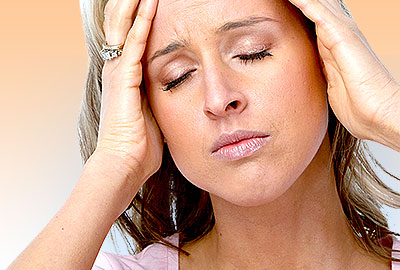The primary cause of menopausal headaches is hormone fluctuations, specifically of estrogen and progesterone. Estrogen causes blood vessels to dilate, and progesterone makes them constrict. When hormones fluctuate, it results in intense pain due to the constant expanding and contracting. Women are more vulnerable to increased frequency and intensity of these headaches as they approach menopause. In fact, women are five times more likely to get migraines than men. Fortunately, there are ways of preventing and managing menopausal headaches.
Causes of Menopausal Headaches
The two most common types of headaches are tension headaches and migraines. Tension headaches mild, everyday headaches that typically only last a few hours. Migraines are more intense, and characterized by frequent, throbbing pain that starts on one side of the head. Migraines can last anywhere from a few hours to a few days.
Women are more susceptible to these kind of headaches when going through menopause due hormone fluctuations. There are other triggers for menopausal headaches, including insufficient sleep, dehydration, skipped meals, stress, bright lights, strong odors, and excessive alcohol and caffeine consumption.
Treatments Options for Menopausal Headaches
There are several effective ways to treat menopausal headaches.
Lifestyle changes
Making simple lifestyle changes, like getting plenty of sleep, maintaining a proper diet, and doing sufficient cardiovascular or aerobic exercise can help prevent headaches and other menopausal symptoms.
Try eating small, healthy meals and snacks every three to four hours to keep blood sugar levels up in order to prevent menopausal headaches. Getting plenty of exercise is key to your overall health, as well as reducing stress and boosting energy levels. Yoga, swimming, cycling, and walking are excellent low-impact workouts.
Medications
If the above methods prove ineffective, an over the counter medicine like aspirin, ibuprofen, or acetaminophen can also be used. These painkillers help stop the migraine in progress by reducing inflammation. If these over the counter medications are not strong enough, talk to your doctor about prescription painkillers.
Menopausal headaches can range from mild to severe and can interfere with daily life and the ability to carry out normal activities. Menopausal headaches are primarily caused by hormone fluctuations, making women more susceptible to frequency and intensity during menopause. There are several ways to help prevent and manage menopausal headaches, like getting plenty of sleep, maintaining a proper diet, and exercising regularly.
Sources
- National Health Service UK. (2013). Hormone headaches. Retrieved August 6, 2014, from http://www.nhs.uk/livewell/headaches/pages/hormonalheadaches.aspx
- Office on Women's Health. (2012). Migraine fact sheet. Retrieved August 6, 2014, from http://www.womenshealth.gov/publications/our-publications/fact-sheet/migraine.html#n




